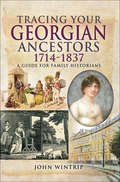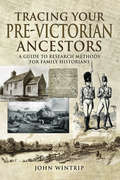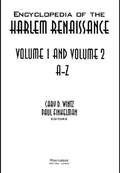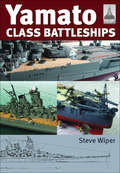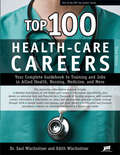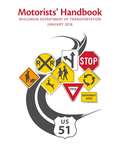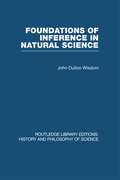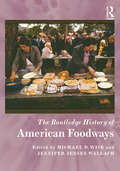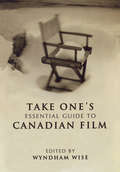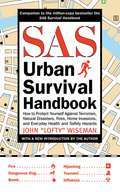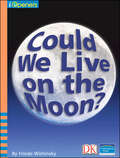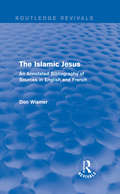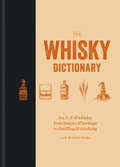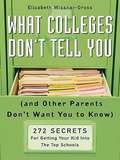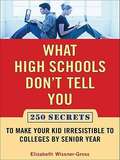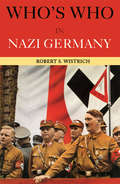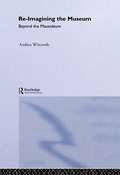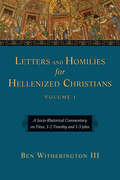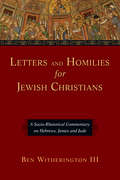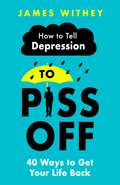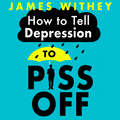- Table View
- List View
Tracing Your Georgian Ancestors, 1714–1837: A Guide for Family Historians (Tracing Your Ancestors)
by John WintripThe Georgian period 1714 to 1837 was a key stage in our modern history so some understanding of it is essential for family historians who want to push their research back into the eighteenth century and beyond, and John Wintrip's handbook is an invaluable introduction to it. In a sequence of concise, insightful chapters he focuses on those aspects of the period that are particularly relevant to genealogical research and he presents a detailed guide to the variety of sources that readers can consult as they pursue their research.While fewer sources are available than for more recent history, obstacles in the way of further research can often be overcome through knowledge of a wide range of sources and a greater understanding the historical context, together with the use of sound research techniques. So the author provides not only a historical overview of relevant topics but he also describes the records of the period in detail.This expert guide to researching the Georgians will open up the field for experienced researchers and for newcomers alike.
Tracing Your Pre-Victorian Ancestors: A Guide to Research Methods for Family Historians (Tracing Your Ancestors)
by John WintripTracing Your Pre-Victorian Ancestors is the ideal handbook for family historians whose research has reached back to the early nineteenth century and are finding it difficult to go further. John Wintrip guides readers through all the steps they can take in order to delve even more deeply into the past. Carrying research through to earlier periods is more challenging because church registers recorded less information than civil registration records and little census data is available. Researchers often encounter obstacles they don't know how to overcome. But, as this book demonstrates, greater understanding of the sources and the specific records within them, along with a wider knowledge of the historical context, often allows progress to be made. Most important, John Wintrip concentrates on how to do the research on the practical steps that can be taken in order to break through these barriers. He looks at online services, archives and their catalogues, factors that can influence the outcome of research, wider family relationships, missing ancestors and mistaken identity. Throughout the book he emphasizes the process of research and the variety of resources and search tools that can be used.
Encyclopedia of the Harlem Renaissance
by Cary D. Wintz Paul FinkelmanFrom the music of Louis Armstrong to the portraits by Beauford Delaney, the writings of Langston Hughes to the debut of the musical Show Boat, the Harlem Renaissance is one of the most significant developments in African-American history in the twentieth century. The Encyclopedia of the Harlem Renaissance, in two-volumes and over 635 entries, is the first comprehensive compilation of information on all aspects of this creative, dynamic period.For a full list of entries, contributors, and more, visit the Encyclopedi a of Harlem Renaissance website.
Yamato Class Battleships: Ijn Yamato Class Battleships (ShipCraft)
by Steve WiperThe Japanese Imperial Navy&’s impressive but ill-fated WWII battleships are examined in detail in this fully illustrated modeling guide. The volume in the ShipCraft series offers in-depth information about building and modifying model kits of WWII Japan&’s Yamato-class battleships. These were the largest warships of the Second World War and the largest battleships ever constructed. They also carried the largest naval artillery ever fitted to a warship. And yet, neither Yamato nor her sistership Musashi made much impact on the War. Musashi was sunk during the battle of Leyte Gulf while Yamato, deployed in a deliberate suicide attack on Allied forces at the battle of Okinawa, was finally sunk by US carrier-based aircraft. This lavishly illustrated volume takes the modeler through a brief history of the Yamato class, then provides step-by-step instruction for building a highly accurate model. Also included are hints on modifying and improving the basic kits and information on paint schemes. The strengths and weaknesses of available kits of the ships are reviewed, and the book concludes with a section on further research references.
Top 100 Health-Care Careers
by Edith Wischnitzer Saul WischnitzerHelps people explore the booming health-care industry and pinpoint occupations right for them. It provides a detailed overview of 100 health-care jobs and includes information about educational requirements, earnings, advancement, certification, and outlook
Wisconsin Motorists' Handbook
by Wisconsin Department of Transportation<p>This manual is intended to inform the user of the rules of the road (Wisconsin state laws and Administrative Rules) and provide important safety tips. Information in this and other handbooks and manuals published by the Division of Motor Vehicles is not all-inclusive and is subject to change at any time due to new or revised laws. <p>This manual gives you information on driving rules and practices to help you become a safe driver of a car or light truck (Class D license). <p>If you want a Commercial Driver License (CDL) to drive a commercial motor vehicle (heavy truck, bus, Class A, B, or C), you should study the Wisconsin Commercial Driver's Manual. <p>If you want a license to operate a motorcycle (Class M license), you should study the Motorcyclists' Handbook.</p>
Wisconsin Motorists' Handbook
by Wisconsin Department of TransportationWisconsin Motorists' Handbook
Foundations of Inference in Natural Science (Routledge Library Editions: History & Philosophy of Science)
by John Oulton WisdomOriginally published in 1952. This book is a critical survey of the views of scientific inference that have been developed since the end of World War I. It contains some detailed exposition of ideas – notably of Keynes – that were cryptically put forward, often quoted, but nowhere explained. Part I discusses and illustrates the method of hypothesis. Part II concerns induction. Part III considers aspects of the theory of probability that seem to bear on the problem of induction and Part IV outlines the shape of this problem and its solution take if transformed by the present approach.
Dot Writing: A Manual Of Literary Braille
by Janet Wise Mary Ellen PesaventoThis is a book for people who want to learn to write braille.
The Routledge History of American Foodways (Routledge Histories Ser.)
by Michael D. Wise Jennifer Jensen Wallach Lindsey R. SwindallThe Routledge History of American Foodways provides an important overview of the main themes surrounding the history of food in the Americas from the pre-colonial era to the present day. By broadly incorporating the latest food studies research, the book explores the major advances that have taken place in the past few decades in this crucial field. The volume is composed of four parts. The first part explores the significant developments in US food history in one of five time periods to situate the topical and thematic chapters to follow. The second part examines the key ingredients in the American diet throughout time, allowing authors to analyze many of these foods as items that originated in or dramatically impacted the Americas as a whole, and not just the United States. The third part focuses on how these ingredients have been transformed into foods identified with the American diet, and on how Americans have produced and presented these foods over the last four centuries. The final section explores how food practices are a means of embodying ideas about identity, showing how food choices, preferences, and stereotypes have been used to create and maintain ideas of difference. Including essays on all the key topics and issues, The Routledge History of American Foodways comprises work from a leading group of scholars and presents a comprehensive survey of the current state of the field. It will be essential reading for all those interested in the history of food in American culture.
Take One's Essential Guide to Canadian Film
by Wyndham WiseTake One's Essential Guide to Canadian Film is the most exhaustive and up-to-date reference book on Canadian film and filmmakers, combining 700 reviews and biographical listings with a detailed chronology of major events in Canadian film and television history. Compiled by Wyndham Wise, the editor and publisher of Take One, Canada's most respected film magazine, with a foreword by Canadian director Patricia Rozema, this is the only reference book of its kind published in English. Each film title is listed with credits, a mini review, and significant awards. Biographical listings of directors, producers, actors, writers, animators, cinematographers, distributors, exhibitors, and independent filmmakers are accompanied by date and place of birth, date of death if applicable, a brief career overview, and a filmography. Wise celebrates Canadian achievement on both a national and an international scale, and juxtaposes the distinctly Canadian with Canada's exports to Hollywood: Maury Chaykin and Jim Carrey, John Candy and William Shatner, Mon Oncle Antoine and Porky's, Highway 61 and Meatballs, The Red Violin and The Art of War.From great early Hollywood stars like Walter Huston, Fay Wray, Mary Pickford, Norma Shearer, and Marie Dressler, to our current crop of star directors - including Patricia Rozema, Atom Egoyan, David Cronenberg, Denys Arcand, Peter Mettler, Guy Maddin, and Robert Lepage - Canadians have made an important but largely unrecorded contribution to the history of world cinema. Impressive for its breadth of coverage, refreshing in its opinionated informality, this comprehensive and lively look at Canadian film culture at the start of the twenty-first century admirably fills the gap.
SAS Urban Survival Handbook: How to Protect Yourself Against Terrorism, Natural Disasters, Fires, Home Invasions, and Everyday Health and Safety Hazards
by John Lofty" WisemanJohn "Lofty" Wiseman is the author of the bestselling SAS Survival Handbook, the definitive guide to survival in the wild from Britain's Special Air Service. Now he has compiled a complete guide to survival in the urban jungle.<P><P> Every year in America there are thousands of fatal accidents in the home--more than on the roads, and many more than in the great outdoors. Fire, electricity, water, gas, sharp knives, poisons, chemicals--these valuable tools can quickly become dangerous weapons when not treated with proper respect and understanding. Add to these the risks of travel, terrorism, muggings, rape, tsunamis, and earthquakes. We are constantly reminded that the world is a dangerous place. Wiseman shows readers how to think realistically and practically about these perils in order to avoid them, whether they are at home, on the street, in school, or in transit. From self-defense techniques to home security systems to coping with natural disasters, this book will teach readers to recognize risks, make quick decisions, and live confidently in the modern urban world.
iOpener: Could We Live on the Moon? (iOpeners)
by Frieda WishinskyThis 703-word book teaches everything about the Moon and explains why it would be so difficult to live there! It covers topics such as air, water, weather, and gravity. This title also includes a section of recommended reading for young space fanatics, an index, a glossary of terms, and discussion questions to aid in reading comprehension. Grade: 2Subject: Earth ScienceGenre: Informational TextComprehension Skill/Strategy: Classify/CategorizeDiagnostic Reading Assessment (DRA/EDL): 28Guided Reading Level: MLexile Level: N/ADK's iOpeners equip K-6 students with the skills and strategies they need to access and comprehend nonfiction so that they are not only learning to read but reading to learn. The combination of high-interest content and eye-popping photography of iOpeners brings science and social studies topics to life, raises student achievement in reading, and boosts standardized test scores.
Routledge Revivals (1977): An Annotated Bibliography of Sources in English and French
by Don WismerFirst published in 1977, this book is intended as a record of sources in Islamic prophetology which focus on the prophet Isa — Jesus in Christian theology. The Islamic Isa differs markedly from the Christian Jesus, most obviously in that, although considered an important prophet, he is overshadowed by Muhammad. The doctrine of tawhid — the indivisible oneness of God — also necessarily means the rejection of Christ’s incarnation or dual nature. The primary of role of Jesus in Islam, as with all Islamic prophets, is to reaffirm the primeval religion of man, best expressed by the Shadada and Islam. This book collects, as comprehensively as possible, bibliographic sources in English and French from the time of the earliest available texts (circa 1650) providing annotated commentary and source information — making it an invaluable research tool for anyone who wishes to study the Islamic Jesus in more detail.
The Whisky Dictionary: An A–Z of whisky, from history & heritage to distilling & drinking
by Ian WisniewskiThis is the drinker's guide to every aspect of whisky, from Scotch to Japanese, rye to bourbon and beyond. With hundreds of entries covering everything from history, ingredients and distilling techniques to flavour notes, cocktails and the many varieties of whisky from all around the world, renowned whisky expert Ian Wisniewski explores and unlocks the wonderful world of a drink like no other.Entries include...Ageing ProcessBourbonCraft MovementFermentationFlavour CompoundsIrish WhiskeyJapanese WhiskeyMaster DistillerOld FashionedOrganic WhiskyProhibitionTasting TechniquesWine Casks...and many more.
The Whisky Dictionary: An AZ of whisky, from history & heritage to distilling & drinking
by Ian WisniewskiThis is the drinker's guide to every aspect of whisky, from Scotch to Japanese, rye to bourbon and beyond. With hundreds of entries covering everything from history, ingredients and distilling techniques to flavour notes, cocktails and the many varieties of whisky from all around the world, renowned whisky expert Ian Wisniewski explores and unlocks the wonderful world of a drink like no other.Entries include...Ageing ProcessBourbonCraft MovementFermentationFlavour CompoundsIrish WhiskeyJapanese WhiskeyMaster DistillerOld FashionedOrganic WhiskyProhibitionTasting TechniquesWine Casks...and many more.
What Colleges Don't Tell You
by Elizabeth Wissner-GrossFrom the author of What Colleges Don't Tell You, 250 secrets for raising the kid colleges will compete to acceptThe headlines prove it: Competition for admission to America's top colleges is more cutthroat than ever. Gone are the days when parents could afford to let high school guidance counselors handle the admissions process alone-gone, also, are the days when a student could wait until senior year to prepare for it. As Elizabeth Wissner-Gross, a highly successful educational strategist, knows from working for over a decade with hundreds of middle- and high school students and their parents, if you want to raise a kid colleges will compete for, you must act, early and aggressively, as opportunity scout, coach, tutor, manager, and publicist-or be willing to watch that acceptance letter go to someone whose parents did. What High Schools Don't Tell You reveals 250 strategies to help parents stack the admissions deck in their kid's favor, gleaned from Wissner-Gross's expertise and from interviews with parents of outstandingly high achievers-strategies that most high school guidance counselors, principals, and teachers simply don't know to share. From identifying exactly which academic credentials will wow an admissions committee to which summer programs and extra-curriculars can turn an ordinary applicant into a must-have, What High Schools Don't Tell You demonstrates how hands-on parental involvement early in a child's high school career is essential to achieving college admissions success.
What High Schools Don't Tell You
by Elizabeth Wissner-GrossFrom the author of What Colleges Don't Tell You, 250 secrets for raising the kid colleges will compete to acceptThe headlines prove it: Competition for admission to America's top colleges is more cutthroat than ever. Gone are the days when parents could afford to let high school guidance counselors handle the admissions process alone-gone, also, are the days when a student could wait until senior year to prepare for it. As Elizabeth Wissner-Gross, a highly successful educational strategist, knows from working for over a decade with hundreds of middle- and high school students and their parents, if you want to raise a kid colleges will compete for, you must act, early and aggressively, as opportunity scout, coach, tutor, manager, and publicist-or be willing to watch that acceptance letter go to someone whose parents did. What High Schools Don't Tell You reveals 250 strategies to help parents stack the admissions deck in their kid's favor, gleaned from Wissner-Gross's expertise and from interviews with parents of outstandingly high achievers-strategies that most high school guidance counselors, principals, and teachers simply don't know to share. From identifying exactly which academic credentials will wow an admissions committee to which summer programs and extra-curriculars can turn an ordinary applicant into a must-have, What High Schools Don't Tell You demonstrates how hands-on parental involvement early in a child's high school career is essential to achieving college admissions success.
Who's Who in Nazi Germany
by Robert S. WistrichWho's Who in Nazi Germany looks at the individuals who influenced every aspect of life in Nazi Germany. It covers a representative cross-section of German society from 1933-1945, and includes:* Nazi Party leaders; SS, Wehrmacht and Gestapo personalities; civil service and diplomatic personnel* industrialists, churchmen, intellectuals, artists, entertainers and sports personalities* resistance leaders, political dissidents, critics and victims of the regime* extensive biographical information on each figure extending into the post-war period* analysis of their role and significance in Nazi Germany* an accessible, easy to use A-Z layout* a glossary and comprehensive bibliography.
Re-Imagining the Museum: Beyond the Mausoleum (Museum Meanings)
by Andrea WitcombRe-Imagining the Museum presents new interpretations of museum history and contemporary museum practices. Through a range of case studies from the UK, North America and Australia, Andrea Witcomb moves away from the idea that museums are always 'conservative' to suggest they have a long history of engaging with popular culture and addressing a variety of audiences. She argues that museums are key mediators between high and popular culture and between government, media practitioners, cultural policy-makers and museums professionals. Analyzing links between museums and the media, looking at the role of museums in cities, and discussing the effects on museums of cultural policies, Re-Imagining the Museum presents a vital tool in the study of museum practice.
Letters and Homilies for Hellenized Christians: A Socio-Rhetorical Commentary on Titus, 1-2 Timothy and 1-3 John (Letters and Homilies Series #Volume 1)
by Ben Witherington IIILetters and Homilies for Hellenized Christians
Letters and Homilies for Jewish Christians: A Socio-Rhetorical Commentary on Hebrews, James and Jude (Letters And Homilies Ser.)
by Ben Witherington IIIIn this commentary on Hebrews, James and Jude, Ben Witherington III applies his socio-rhetorical method to elucidate these letters within their primarily Jewish context, probing the social setting of the readers and the rhetorical strategies of the authors of the letters.
How To Tell Depression to Piss Off: 40 Ways to Get Your Life Back
by James WitheyDepression sucks, but you don't.Trying to manage the range of symptoms that depression throws at you is like navigating the dark ocean floor when you are without a torch and don't know how to swim. How do you manage something that feels utterly unmanageable? How do you get through each day when depression is telling you you're a worthless lump of camel spleen? What you need is a guide. A really good one. You need to know what works and what to do.This book gives you 40 ways to get to a better place with depression. They are born out of the author's personal experience of clinical depression and his many years of working as a counsellor helping people with their mental health. James lives with depression and knows its lies, the traps it makes and how to dodge when it starts spitting bile in your face. Nice, eh?The ways include:- Kick your cuckoo. We don't usually encourage violence towards birds, but no cuckoos are actually harmed so don't call the RSPCA just yet. In this chapter you're encouraged to imagine your depression as an external 'thing' (no humans or animals, of course!) and that you can 'kick out', which is great fun. - Whose voice is it anyway? Spoiler alert! That nasty voice you're hearing isn't you; it's depression. The illness. When you start to recognise its voice you can start swearing back and who doesn't love a bit of swearing?- Don't listen to the lies. We all tell little lies sometimes, right? But depression is the biggest liar in the whole universe. It makes Pinocchio look like Mother Theresa. Be the lie detector to depression's fibs; call it out on its fraudulent nonsense. - Do the opposite. Depression will try to convince you to stay in bed, don't go out, don't wash, don't eat, don't phone anyone. Be Contrary Mary and do the exact opposite of what depression tells you because it never has your interests at heart. Plus, doing the opposite feels like you're a rebel, and rebels are cool (see Star Wars). At whatever point you're at with your depression, this book can help and provide some laughs along the way - hooray! - because you really need it with this bloody illness.
How To Tell Depression to Piss Off: 40 Ways to Get Your Life Back
by James WitheyDepression sucks, but you don't.Trying to manage the range of symptoms that depression throws at you is like navigating the dark ocean floor when you are without a torch and don't know how to swim. How do you manage something that feels utterly unmanageable? How do you get through each day when depression is telling you you're a worthless lump of camel spleen? What you need is a guide. A really good one. You need to know what works and what to do.This book gives you 40 ways to get to a better place with depression. They are born out of the author's personal experience of clinical depression and his many years of working as a counsellor helping people with their mental health. James lives with depression and knows its lies, the traps it makes and how to dodge when it starts spitting bile in your face. Nice, eh?The ways include:- Kick your cuckoo. We don't usually encourage violence towards birds, but no cuckoos are actually harmed so don't call the RSPCA just yet. In this chapter you're encouraged to imagine your depression as an external 'thing' (no humans or animals, of course!) and that you can 'kick out', which is great fun. - Whose voice is it anyway? Spoiler alert! That nasty voice you're hearing isn't you; it's depression. The illness. When you start to recognise its voice you can start swearing back and who doesn't love a bit of swearing?- Don't listen to the lies. We all tell little lies sometimes, right? But depression is the biggest liar in the whole universe. It makes Pinocchio look like Mother Theresa. Be the lie detector to depression's fibs; call it out on its fraudulent nonsense. - Do the opposite. Depression will try to convince you to stay in bed, don't go out, don't wash, don't eat, don't phone anyone. Be Contrary Mary and do the exact opposite of what depression tells you because it never has your interests at heart. Plus, doing the opposite feels like you're a rebel, and rebels are cool (see Star Wars). At whatever point you're at with your depression, this book can help and provide some laughs along the way - hooray! - because you really need it with this bloody illness.
How To Tell Depression to Piss Off: 40 Ways to Get Your Life Back
by James WitheyDepression sucks, but you don't.Trying to manage the range of symptoms that depression throws at you is like navigating the dark ocean floor when you are without a torch and don't know how to swim. How do you manage something that feels utterly unmanageable? How do you get through each day when depression is telling you you're a worthless lump of camel spleen? What you need is a guide. A really good one. You need to know what works and what to do.This book gives you 40 ways to get to a better place with depression. They are born out of the author's personal experience of clinical depression and his many years of working as a counsellor helping people with their mental health. James lives with depression and knows its lies, the traps it makes and how to dodge when it starts spitting bile in your face. Nice, eh?The ways include:- Kick your cuckoo. We don't usually encourage violence towards birds, but no cuckoos are actually harmed so don't call the RSPCA just yet. In this chapter you're encouraged to imagine your depression as an external 'thing' (no humans or animals, of course!) and that you can 'kick out', which is great fun. - Whose voice is it anyway? Spoiler alert! That nasty voice you're hearing isn't you; it's depression. The illness. When you start to recognise its voice you can start swearing back and who doesn't love a bit of swearing?- Don't listen to the lies. We all tell little lies sometimes, right? But depression is the biggest liar in the whole universe. It makes Pinocchio look like Mother Theresa. Be the lie detector to depression's fibs; call it out on its fraudulent nonsense. - Do the opposite. Depression will try to convince you to stay in bed, don't go out, don't wash, don't eat, don't phone anyone. Be Contrary Mary and do the exact opposite of what depression tells you because it never has your interests at heart. Plus, doing the opposite feels like you're a rebel, and rebels are cool (see Star Wars). At whatever point you're at with your depression, this book can help and provide some laughs along the way - hooray! - because you really need it with this bloody illness.
